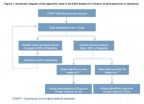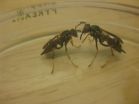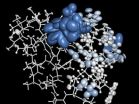(Press-News.org) 10 February 2014, Singapore: New trial results1 have shown that the world's first Double
Intravenous Vasopressor Automated (DIVA) System affords superior control of maternal blood pressure in women undergoing caesarean section under spinal anaesthesia, when compared with manually-administered medication to manage reduced blood pressure (vasopressor).
Developed by doctors at KK Women's and Children's Hospital (KKH), the novel DIVA System detects and responds rapidly to low blood pressure and/or slow heart rate in real time by auto-administering a precise amount of the recommended vasopressor. The system uses an advanced decision algorithm to help enhance patient safety.
Randomised controlled double-blinded trial:
Putting the DIVA System to the test, the KKH team conducted a randomised controlled double-blinded trial1 involving 213 healthy women between the ages of 21 and 45, with singleton full-term pregnancies. The women underwent elective caesarean delivery under spinal anaesthesia. The system was enhanced with a more responsive vasopressor delivery algorithm, enabling swifter intervention to manage changes in maternal blood pressure.
Compared to the women whose vasopressors were manually administered, women who underwent blood pressure management by the DIVA System experienced:
Better systolic blood pressure control
Reduced incidence of nausea
The trial results reinforce findings from a 2011 preliminary study2 jointly carried out by KKH and Duke-NUS Graduate Medical School (Duke-NUS GMS) on 55 women between the ages of 21 and 45, which showed that the DIVA System is clinically more effective in maintaining blood pressure during caesarean sections under spinal anaesthesia than traditional physician-administered techniques using conventional blood pressure monitoring.
DIVA System's enhanced speed and accuracy delivers a safer and better birth experience for patients
The trial was conducted among KKH patients from October 2011 to July 2012. The principal investigators were Professor Alex Sia, Chairman, Medical Board, KKH, and Dr Sng Ban Leong, Consultant, Department of Women's Anaesthesia, KKH. They were assisted by Mr Paul Tan Hon Sen, a third-year medical student at Duke-NUS GMS.
"During the trial, the women who underwent blood pressure management using the DIVA system experienced less hypotension and reduced incidence of nausea, with no increase in the amount of vasopressor required. These are important enhancements to patients' care and experience during caesarean delivery," says Dr Sng.
"With the enhanced algorithm, the system is even more responsive to blood pressure fluctuations. This enables us to keep a tighter control of maternal blood pressure and tailor vasopressor administration to the patient's individual need."
For Prof Sia, who is also Senior Consultant, Department of Women's Anaesthesia, KKH, the results of the clinical trial are an affirmation of the importance of innovation in enhancing patient safety, experience and clinical outcomes.
"We are always on the lookout for innovative ways to better the quality of care we can provide to patients. The DIVA System helps us to monitor our patients more closely and provide medical intervention almost instantaneously. This provides them a more comfortable experience during caesarean delivery, and most importantly, reinforces maternal and fetal safety."
The study was approved by the SingHealth Centralised Institutional Review Board and funded by a National Medical Research Council Exploratory Development Grant. The team has been awarded a SingHealth Foundation Grant to further enhance the system.
Better blood pressure management with the DIVA System
Low blood pressure can occur in up to 60 percent of caesarean sections under spinal anaesthesia, requiring the administration of vasopressors by the attending anaesthetist. Low blood pressure can cause nausea in the mother and, in severe cases, result in reduced blood flow to the baby unless medical intervention is provided.
When a mother undergoes a caesarean section under spinal anaesthesia at KKH, the attending anaesthetist administers spinal anaesthesia and monitors blood pressure throughout the surgical procedure. Where required, the anaesthetist manually administers vasopressors to maintain optimal blood pressure.
Optimal timing and dosing of vasopressors is dependent on accurate and timely blood pressure monitoring. Conventional non-invasive blood pressure monitoring occurs at 60 second intervals – which could result in a potential delay in detecting rapid blood pressure changes within these 60 seconds.
Setting a new standard in speed and accuracy, the DIVA System is an automated dual-pump system which innovatively integrates continuous non-invasive blood pressure monitoring to ensure closed-loop vasopressor administration during the surgery. It continuously measures and records blood pressure and heart rate every second, allowing extremely rapid detection of blood pressure changes and episodes of low blood pressure.
When low blood pressure and/or slow heart rate are detected, the DIVA System automatically, promptly and safely administers the precise amount of the appropriate vasopressor required to restore optimal blood pressure – making the process much more efficient than manual administration.
Caesarean sections are commonly performed under spinal or epidural anaesthesia, and patients remain awake during the procedure.
How the DIVA System works
The DIVA System calculates the amount of vasopressor to administer using a customised algorithm based on integrated blood pressure data from a continuous non-invasive arterial blood pressure (CNAPTM) monitoring system. A closed-loop feedback system controls vasopressor administration, ensuring that the patient receives only the precise dosage required (Figure 1).
The system functions as follows:
Two alternating finger cuffs measure the patient's arterial blood pressure and heart rate per second.
The data is exported to a laptop computer, and integrated every ten seconds using a customised programme to determine the dosage of vasopressor required.
If low blood pressure occurs, phenylephrine is administered automatically via a syringe pump. If low blood pressure occurs in conjunction with slow heart rate, ephedrine is administered instead via a different syringe pump.
The vasopressor is administered over ten seconds, followed by a ten-second lockout period to permit the vasopressor to take effect.
Benefits of the DIVA System:
Non-invasive, rapid and automatic detection and response to low blood pressure and slow heart rate
Delivers individualised optimal vasopressor dosing regimen
Maintains systolic blood pressure near to baseline blood pressure3
Alleviates pre-delivery nausea and vomiting
INFORMATION: END
New trial results affirm better blood pressure management during C-section
With world's first automated blood pressure management system developed by KK Women's and Children's Hospital
2014-02-10
ELSE PRESS RELEASES FROM THIS DATE:
Normal enzyme aids a mutant 1 to fuel blood cancer's growth
2014-02-10
BOSTON (Feb. 10, 2014)—Reinforcing the need to look beyond genomic alterations to understand the complexity of cancer, researchers from Dana-Farber/Boston Children's Cancer and Blood Disorders Center report that a normal enzyme called SYK pairs with FLT3, the most commonly mutated enzyme found in acute myelogenous leukemia (AML), to promote progression of the disease. This molecular partnership also promotes AML cells' resistance to treatment with FLT3-blocking drugs, potentially explaining the relatively poor showing of FLT3 inhibitors in multiple clinical studies. In ...
Flat-pack lens boosts solar power
2014-02-10
Micro-machining could be used to create almost flat, Fresnel lenses, that boost the electrical efficiency of solar panels, according to researchers in China.
Fresnel lenses were invented by French engineer and scientist Augustin-Jean Fresnel, in the early nineteenth century, they are essential two-dimensional equivalents of conventional optical lens, but they have ridges in concentric rings that focus the light to a point behind the lens without the three-dimensional bulk of a conventional lens. Image quality is reduced when using a Fresnel lens to focus because the concentric ...
Study reveals unexpected cell hijack method in pancreatic cancer
2014-02-10
Pancreatic stellate cells, which normally aid tissue repair, unwittingly help pancreatic cancer grow and spread in a method of 'cell hijack' only seen before in brain and breast cancer, according to new research from Queen Mary University of London.
The research, published in the latest issue of EMBO Molecular Medicine and carried out by Queen Mary's Barts Cancer Institute, also revealed the process can be blocked, thereby preventing the growth and spread of the tumour.
The study, funded by the UK charity Pancreatic Cancer Research Fund, set out to investigate the messaging ...
EORTC characterizes responders & survivors on pazopanib for advanced soft tissue sarcoma
2014-02-10
An EORTC analysis appearing in Annals of Oncology confirmed the importance of known prognostic factors such as performance status and tumor grading for having a long-term outcome in patients treated with pazopanib for metastatic soft tissue sarcoma. Additionally, hemoglobin at baseline was found to be a new prognostic factor.
Soft tissue sarcomas are a heterogeneous and relatively rare tumor with an estimated incidence of four per 100,000 people per year in Europe. The prognosis for patients with this disease is favorable if they are diagnosed at an early stage and if ...
Massive neutrinos solve a cosmological conundrum
2014-02-10
Scientists have solved a major problem with the current standard model of cosmology identified by combining results from the Planck spacecraft and measurements of gravitational lensing in order to deduce the mass of ghostly sub-atomic particles called neutrinos.
The team, from the universities of Manchester and Nottingham, used observations of the Big Bang and the curvature of space-time to accurately measure the mass of these elementary particles for the first time.
The recent Planck spacecraft observations of the Cosmic Microwave Background (CMB) – the fading glow ...
Wasps use ancient aggression genes to create social groups
2014-02-10
Aggression-causing genes appeared early in animal evolution and have maintained their roles for millions of years and across many species, even though animal aggression today varies widely from territorial fighting to setting up social hierarchies, according to researchers from Iowa State University, Penn State and Grand Valley State University.
If these "mean genes" keep their roles in different animals and in different contexts, then perhaps model organisms -- such as bees and mice -- can provide insights into the biological basis of aggression in all animals, including ...
Dental care in school breaks down social inequalities
2014-02-10
A new survey conducted by the University of Copenhagen and the World Health Organization (WHO) is highlighting the role of schools in work to promote health and prevent disease.
"Children in Scandinavia generally have healthy teeth and gums, largely on account of dental care in schools for all children, the arrival of fluoride toothpaste on the market, a healthy lifestyle and high living standards. But the situation in the poorest countries of the world is very different to that in Scandinavia. However, it is positive to note that the WHO's Health Promoting Schools Initiative ...
Threatened eels disappear in the deep on their way to the Sargasso Sea
2014-02-10
When the threatened European eels cross the Atlantic Ocean to get to the Sargasso Sea to spawn, they swim in deep water. But this does not protect them from predators, researchers from the University of Southern Denmark report: Even in deep water the eels are hunted and eaten.
The European eel is in decline, and all over the world biologists are struggling to map its mysterious life cycle in order to bring its numbers back up. One of the great puzzles is why and how the eel each year travels thousands of kilometers to get to the Sargasso Sea to spawn.
A European monitoring ...
The chemistry of love: Valentine's Day science from ACS Reactions
2014-02-10
WASHINGTON, Feb. 10, 2014 — Love has inspired timeless songs and sonnets — not to mention a few less-than-timeless romantic comedies. Now the chemistry of love is the subject of the latest episode of the American Chemical Society's Reactions YouTube series (formerly Bytesize Science). Just in time for Valentine's Day, the video is available at http://youtu.be/bp7Ydv5wAPk.
The video explains how feel-good neurotransmitters like dopamine and oxytocin fuel lifelong pair bonds in prairie voles, which — along with humans — are the mammalian kingdom's leading monogamists. "If ...
Sometimes the average just isn't good enough
2014-02-10
This news release is available in German. When averaging is good and when it's not
Usually averaging is a good thing that can make life a lot easier. For example, when you eat out with a group of friends and it comes to paying. If everyone had a meal and a drink and you split the bill total by the number of people, everyone will pay pretty close to what they would have paid for their individual meal and drink. However, if some people had a starter, a steak for main, a dessert and champagne while you had spaghetti and a soft drink, you will feel pretty much ripped ...
LAST 30 PRESS RELEASES:
Pollen exposure linked to poorer exam results taken at the end of secondary school
7 hours 18 mins may be optimal sleep length for avoiding type 2 diabetes precursor
Around 6 deaths a year linked to clubbing in the UK
Children’s development set back years by Covid lockdowns, study reveals
Four decades of data give unique insight into the Sun’s inner life
Urban trees can absorb more CO₂ than cars emit during summer
Fund for Science and Technology awards $15 million to Scripps Oceanography
New NIH grant advances Lupus protein research
New farm-scale biochar system could cut agricultural emissions by 75 percent while removing carbon from the atmosphere
From herbal waste to high performance clean water material: Turning traditional medicine residues into powerful biochar
New sulfur-iron biochar shows powerful ability to lock up arsenic and cadmium in contaminated soils
AI-driven chart review accurately identifies potential rare disease trial participants in new study
Paleontologist Stephen Chester and colleagues reveal new clues about early primate evolution
UF research finds a gentler way to treat aggressive gum disease
Strong alcohol policy could reduce cancer in Canada
Air pollution from wildfires linked to higher rate of stroke
Tiny flows, big insights: microfluidics system boosts super-resolution microscopy
Pennington Biomedical researcher publishes editorial in leading American Heart Association journal
New tool reveals the secrets of HIV-infected cells
HMH scientists calculate breathing-brain wave rhythms in deepest sleep
Electron microscopy shows ‘mouse bite’ defects in semiconductors
Ochsner Children's CEO joins Make-A-Wish Board
Research spotlight: Exploring the neural basis of visual imagination
Wildlife imaging shows that AI models aren’t as smart as we think
Prolonged drought linked to instability in key nitrogen-cycling microbes in Connecticut salt marsh
Self-cleaning fuel cells? Researchers reveal steam-powered fix for ‘sulfur poisoning’
Bacteria found in mouth and gut may help protect against severe peanut allergic reactions
Ultra-processed foods in preschool years associated with behavioural difficulties in childhood
A fanged frog long thought to be one species is revealing itself to be several
Weill Cornell Medicine selected for Prostate Cancer Foundation Challenge Award
[Press-News.org] New trial results affirm better blood pressure management during C-sectionWith world's first automated blood pressure management system developed by KK Women's and Children's Hospital





